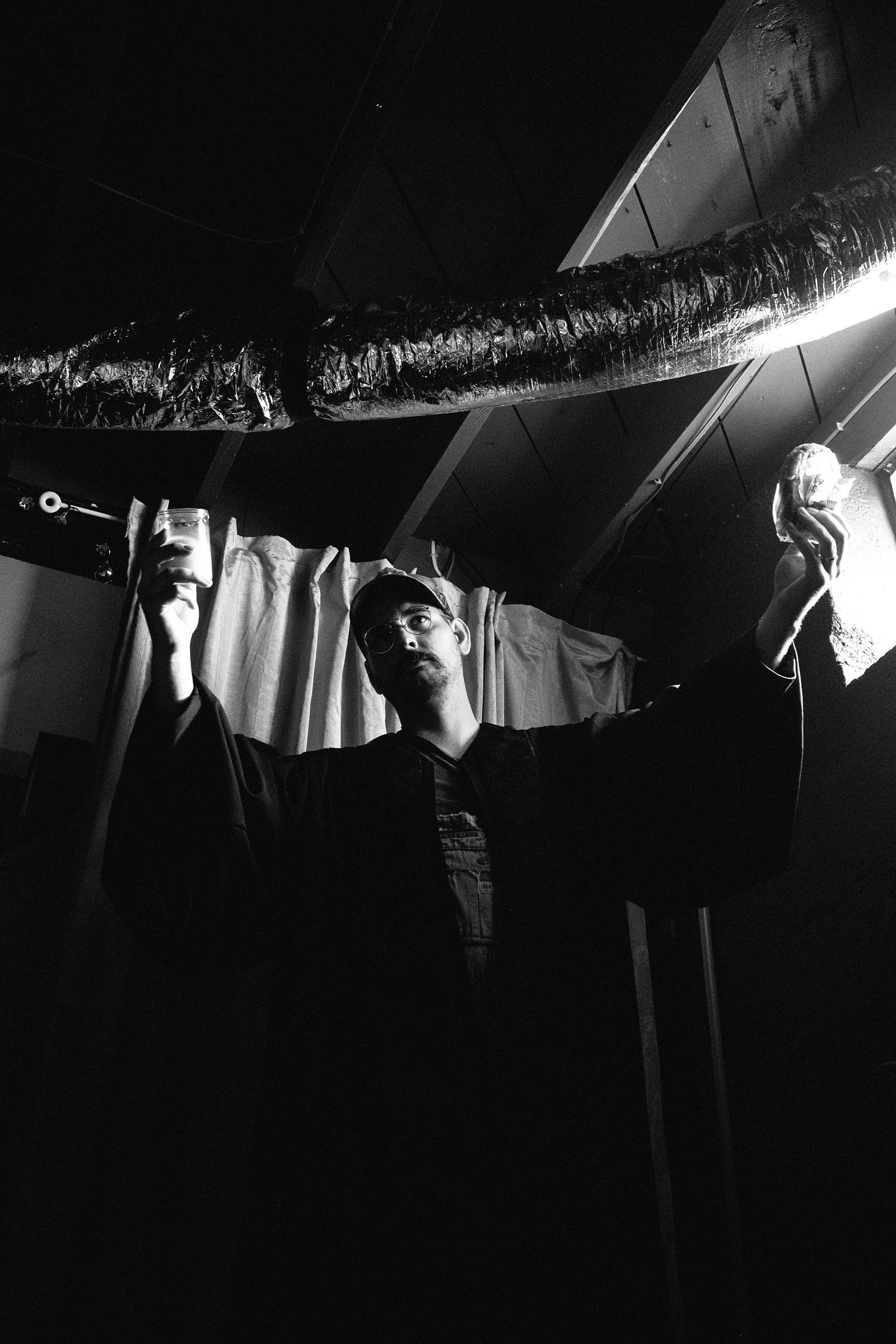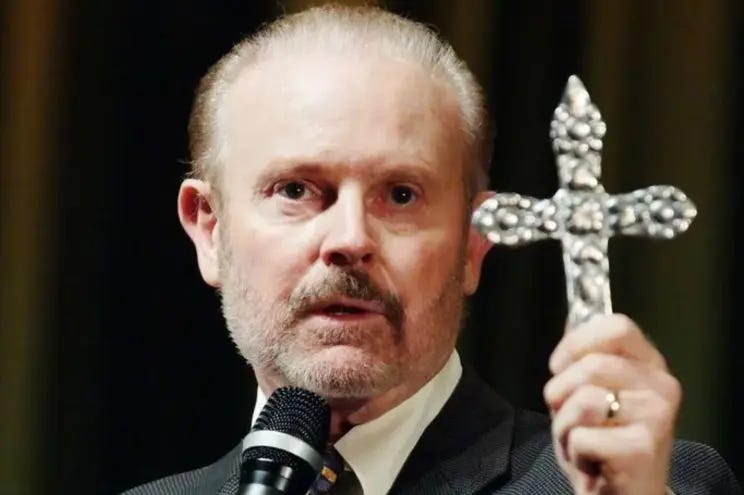Let's Talk about Demons
...and why I won't secularize my songs
One of the most noxious critiques I have received from liberals and lefties about Hillbilly Hymn is that religion is too magical, too irrational, too foolish, and, ultimately, too divisive to make the song any good. Setting aside the ways employing religious language is not the same as belonging to, let alone endorsing, a religious tradition, I have another line of frustration with this criticism. Religious language, especially when it is deployed as a poetic vocabulary rather than a way of policing belonging to religious hierarchies, offers a descriptive power that few other linguistic resources can. When we attempt to give accounts of the complicated ways we negotiate the world, some things are simply harder to describe in linear, informational terms. For example, explaining the workings of whiteness, the process of healing intergenerational trauma, or the trappings of patriarchy challenge the ways well-behaved rationalist accounts frame notions like choice, conscience, power, individuality, cultural inheritance, and responsibility. Plus, the task of the artist isn’t to simply explicate the world, but to help us locate ourselves as active participants in it. An artist worth their salt does not describe the world, they evoke it. This requires drawing on ways of communicating that outstrip the extremely limited poetic capabilities of well-disciplined rationalism.
In our present moment, we have to give account of the ways the powerful organize their behavior around the unthinkable. Our political moment, determined by right-wing accelerationism, is beyond the sensible, the rational, and even the self-preserving. A quick survey of everything from climate policy to childcare, debt relief to widespread militarism shows that our current times are defined by political actors who are willing to undermine the very possibility of the future in order to feed the interests of power and capital in the present. Having our wits about us requires using language that accounts for cultural forces that operate at deeper, more compelling levels than our intellect. We have to find a way of describing a thoughtlessness that supervenes on people’s intellectual, moral, and affective capacities before they can even begin to identify, let alone critically examine, what it is that compels them. We need language that can conjure up more than information and can locate people and institutions within the cosmos of forces that determine their actions. It is not enough to talk about the people who make the world worse. We also have to talk about the ghosts they are trying to appease in doing so.
This is why I want to talk about demons. Not because I want to push people down a Bob Larson Youtube rabbit hole (though maybe I do), but because the notion of possession so aptly fits our cultural and political moment. To be clear, I am not saying our leaders are demon possessed, (though I won’t stop you from making your own assessment). Rather, I am arguing that possession describes the kinds of agency they wield.
Not to flex, but as a recovering fundie, I am the veteran of a few exorcisms. Here’s what I’ve observed about possession:
The possessed are rarely aware of their own possession because the demons that possess them lay hold to their entire person. Everything—their conscience, kindness, sociality, creativity, thought, memory—is put to use by the anti-social parasite that claims them. A possessed person will still exercise logic, have manners, and keep friends. You can always say “Well, they were nice to me,” and they will always be able give a coherent reason for doing what they do. None of that changes the fact they are possessed.
Possession bestows a sense of identity. It forms a sense of self, connects the possessed to others, and shapes desire. This is part of the reason exorcisms are such violent events. They threaten not only physical and emotional exhaustion but spiritual exhaustion in the form of meaninglessness as well. Witnessing a demon summon all of a person’s faculties to desperately protect the thing that plagues them reveals a kind of hopelessness for the host. The possessed cannot imagine themselves beyond the identity given by the possessor. Half their terror of exorcism for the exorcised is having to confront who they would be without possession.
The history of the US has harbored a few key demons. These demons have conjured up wars, left workers broken and hungry, dispossessed groups of their ancestral lands, and turned people into property. Truthfully, America’s primary possession has been possession–viewing the universe as something that can be owned and inventing new horizons of ownership when there is nothing left to claim in the old world. When leftists say we are in late- or end-stage capitalism, we are saying that the demons that possess us are running out of things to possess. Like a parasite that has eaten through its host and begins to consume vital organs, we are in an economic and political stage where nothing is outside the control of America’s constitutive demons. We have reached total, fully-matured possession.
Artists, for instance, are keenly aware that we have hit the ceiling. The logic of possession is no longer content with owning the material world. It now extends into the depths of our humanity in the form of the attention economy and the emergence of AI as a force of creative dispossession. The tools of war and work have reached our most inaccessible, interior spaces. The sum of our rational, emotional, social, or spiritual faculties have now been colonized by the parasite. There is nothing left in the possessed to resist the possessor.
This total possession also includes our economic and political leaders who are beholden to the interests of war and money. Through mechanisms like campaign finance, gerrymandering, deregulation, union-busting, propaganda, and a host of other minutiae, even our elected officials are functionally insulated from democratic accountability. We are in an era of American evil where the leaders do not create the monster, but the monster creates the leaders. They exist as a technology of the beast, enacting its will rather than guiding it.
As a songwriter, I refuse to secularize my lyrics not only because apocalyptic American Christianity is a significant part of my cultural inheritance, but also because so much of religious language contains a poetics that is capable of articulating what lays hold to us before we arrive at the narrow ways we process information or argue about ideas. It offers a way of accessing everything that cannot be sorted out with linear reason. Taking possession seriously as a way of describing the hold right-wing interests have on our present moment lends some clarity to the times we are living in. It reminds me that exorcisms are acts of passion that go deeper than intellect, that the possessed deserve love, that demons deserve no quarter, that I too am susceptible to possession so I must make friends with my own exorcists, that the possessed sometimes pursue self-preservation to protect what possesses them even though it will ultimately destroy them, and that the job of the exorcist is to imagine for the possessed a sense of who they are that they cannot imagine for themselves—freedom.




"The job of the exorcist is to imagine for the possessed a sense of who they are that they cannot imagine for themselves" As a Christian deeply disillusioned and disturbed with right wing politics and church-ianity, It is a breath of fresh hope to begin to imagine- perhaps there is another way. Your "hillbilly hymn" helped me begin to hope for one- and as an Asheville/Hendersonville native - atheist turned postmillennial Christian, who swallowed the red pill and then coughed it back up- it felt like a path back home- A path I would happily walk any distance if it meant I could sit on the porch snapping beans with my bible thumping granny, my outlaw mother, my gay brother and my redneck uncles while singing merrily of the Lord's kind return.
Dare I say “amen”?